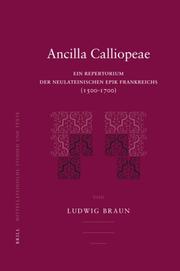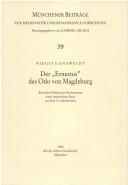| Listing 1 - 10 of 69 | << page >> |
Sort by
|
Book
ISBN: 9783110663464 3110663465 Year: 2020 Publisher: Berlin, Germany De Gruyter
Abstract | Keywords | Export | Availability | Bookmark
 Loading...
Loading...Choose an application
- Reference Manager
- EndNote
- RefWorks (Direct export to RefWorks)
Die Ausgabe des Ysengrimus bietet erstmals den lateinischen Text mit einer neuen deutschen Prosaübersetzung, die den sophistischen Stil der Vorlage bewahrt und zugleich die Lesbarkeit im Auge behält. Das in 3287 elegischen Distichen abgefasste Tierepos entstand um die Mitte des 12. Jahrhunderts in der Gegend um Gent und prangert in einer scharfen Satire die kirchlichen und klösterlichen Verhältnisse seiner Zeit an. Der unbekannte Verfasser verfügt über ein breites Spektrum an Spielarten des Humors, das vom einfachen Wortwitz über slapstickartige Handlungskomik und ironisches Sprechen bis zu bitterem Sarkasmus reicht. Die heillose Welt, die auf die Apokalypse zusteuert, wird dem Lachen preisgegeben, einem Lachen, das freilich an Verzweiflung grenzt und im Halse stecken zu bleiben droht. Der Autor ist ein glänzender Erzähler, dessen narratives Potenzial manche Entwicklungen der Moderne (Zeitlupe, stream of consciousness) vorwegnimmt. Es verwundert nicht, dass dieser großartige Text den Ausgangspunkt für die volkssprachige Tierepik vom altfranzösischen Roman de Renart über den mittelniederländischen Van den vos Reynaerde und den mittelniederdeutschen Reynke de vos bis hin zu Goethes Reineke Fuchs und dem Comic Fix und Foxi bildet. This new translation of Ysengrimus (written by a clergyman around the mid-12th century) includes a literary-historical introduction as well as notes that explain the text's historical allusions. This strident satire of contemporary monasticism and the state of the Church is a precursor and point of departure for vernacular animal epics from the Roman de Renart via Goethe's Reineke Fuchs all the way to the comic Fix und Foxi.
Book
ISBN: 9781802702293 Year: 2024 Publisher: Amsterdam : Arc Humanities Press
Abstract | Keywords | Export | Availability | Bookmark
 Loading...
Loading...Choose an application
- Reference Manager
- EndNote
- RefWorks (Direct export to RefWorks)
Latin epic poetry flourished in the Grand Duchy of Lithuania between the early sixteenth and late seventeenth centuries, accompanied by the widely accepted belief that the Lithuanian language was a corrupted form of Latin and therefore Latin should be Lithuania's national language. This edition presents translations of three key epics that reflect the beginnings, maturity and decline of the epic tradition in Lithuania: The Prussian War (1516) by Joannes Vislicensis; The Muscovite Expedition (1582) by Francisczek Gradowski; and The Strength of the Lord's Right Arm (1674) by James Bennett. Between them, these epics show the creativity and inventiveness of the Lithuanian Latin epic tradition and the involvement of authors from different ethnic backgrounds in creating a national literature for early modern Central Europe's largest state.

ISBN: 1281936820 9786611936822 9047422481 9789047422488 9781281936820 6611936823 9789004162426 9004162429 Year: 2007 Publisher: Leiden Boston
Abstract | Keywords | Export | Availability | Bookmark
 Loading...
Loading...Choose an application
- Reference Manager
- EndNote
- RefWorks (Direct export to RefWorks)
This book presents for the first time a panorama of about 85 neo-latin epics composed in France during the 16th and 17th centuries; the collection includes historical, biblical and hagiographic poems, ranging from a few hundred to thirty thousand hexameters. A full account is given of the contents and composition of every poem, the historical, biblical and hagiographic background is explored, and the poets' debt to classical poetry is analyzed with as a clear result the growing influence of Vergil and, during the 17th century, of Tasso as well. The repertorium is intended as a sort of guide, which provides the reader interested in Neo-Latin, Classics or the literary history of France conveniently with well-founded information on this literary genre.
Epic poetry, Latin (Medieval and modern) --- History and criticism. --- Frankrijk.
Book
Abstract | Keywords | Export | Availability | Bookmark
 Loading...
Loading...Choose an application
- Reference Manager
- EndNote
- RefWorks (Direct export to RefWorks)
Epic poetry, Latin (Medieval and modern) --- Charlemagne, --- Poetry.

ISBN: 3920128400 Year: 1989 Volume: vol 39 Publisher: München : Arbeo-Gesellschaft,
Abstract | Keywords | Export | Availability | Bookmark
 Loading...
Loading...Choose an application
- Reference Manager
- EndNote
- RefWorks (Direct export to RefWorks)
Book
ISBN: 0824029631 Year: 1978 Publisher: New York (N.Y.): Garland
Abstract | Keywords | Export | Availability | Bookmark
 Loading...
Loading...Choose an application
- Reference Manager
- EndNote
- RefWorks (Direct export to RefWorks)
Aeneas (Legendary character) --- Epic poetry, Latin (Medieval and modern) --- Epic poetry, Latin (Medieval and modern) --- Legends --- Poetry --- Translations into English --- Translations into Scots --- Poetry
Book
ISBN: 9789042933545 9042933542 Year: 2016 Volume: 22 Publisher: Leuven Peeters
Abstract | Keywords | Export | Availability | Bookmark
 Loading...
Loading...Choose an application
- Reference Manager
- EndNote
- RefWorks (Direct export to RefWorks)
Book
ISBN: 0865160732 9780865160736 0865160988 9780865160989 Year: 1985 Publisher: Chicago (Ill.): Bolchazy-Carducci,
Abstract | Keywords | Export | Availability | Bookmark
 Loading...
Loading...Choose an application
- Reference Manager
- EndNote
- RefWorks (Direct export to RefWorks)
Book
ISBN: 9783534090730 353409073X Year: 1993 Publisher: Darmstadt: Wissenschaftliche Buchgesellschaft,
Abstract | Keywords | Export | Availability | Bookmark
 Loading...
Loading...Choose an application
- Reference Manager
- EndNote
- RefWorks (Direct export to RefWorks)
Book
ISBN: 8821536637 Year: 1997 Publisher: Cinesello Balsamo : San Paolo,
Abstract | Keywords | Export | Availability | Bookmark
 Loading...
Loading...Choose an application
- Reference Manager
- EndNote
- RefWorks (Direct export to RefWorks)
Aeneas (Legendary character) --- Epic poetry, Latin (Medieval and modern) --- Legends --- Translations into Italian. --- Virgil.
| Listing 1 - 10 of 69 | << page >> |
Sort by
|

 Search
Search Feedback
Feedback About UniCat
About UniCat  Help
Help News
News